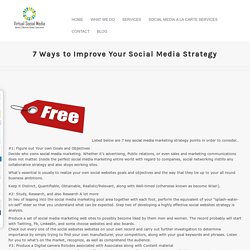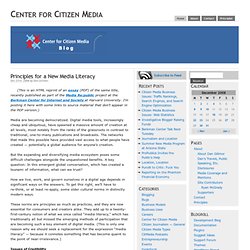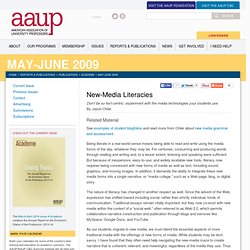

7 Ways to Improve Your Social Media Strategy. Listed below are 7 key social media marketing strategy points in order to consider… #1: Figure out Your own Goals and Objectives Decide who owns social media marketing.

Whether it’s advertising, Public relations, or even sales and marketing communications does not matter. Inside the perfect social media marketing entire world with regard to companies, social networking instills any collaborative strategy and also stops working silos. What’s essential is usually to realize your own social websites goals and objectives and the way that they tie up to your all round business ambitions. Keep it Distinct, Quantifiable, Obtainable, Realistic/Relevant, along with Well-timed (otherwise known as become Wise!).
#2: Study, Research, and also Research A lot more In lieu of leaping into the social media marketing pool area together with each foot, perform the equivalent of your “splash-water-on-self” steer so that you understand what can be expected. Let’s go ahead and take several popular aims: Principles for a New Media Literacy – Center for Citizen Media. (This is an HTML reprint of an essay (PDF) of the same title, recently published as part of the Media Re:public project at the Berkman Center for Internet and Society at Harvard University.

I’m posting it here with some links to source material that don’t appear in the PDF version.) Media are becoming democratized. Digital media tools, increasingly cheap and ubiquitous, have spawned a massive amount of creation at all levels, most notably from the ranks of the grassroots in contrast to traditional, one-to-many publications and broadcasts. The networks that made this possible have provided vast access to what people have created — potentially a global audience for anyone’s creation. But the expanding and diversifying media ecosystem poses some difficult challenges alongside the unquestioned benefits. How we live, work, and govern ourselves in a digital age depends in significant ways on the answers. Issues of Credibility Trust and credibility are not new to the Digital Age. 1. 2. 3. 4. New-Media Literacies.
Being literate in a real-world sense means being able to read and write using the media forms of the day, whatever they may be.

For centuries, consuming and producing words through reading and writing and, to a lesser extent, listening and speaking were sufficient. But because of inexpensive, easy-to-use, and widely available new tools, literacy now requires being conversant with new forms of media as well as text, including sound, graphics, and moving images. In addition, it demands the ability to integrate these new media forms into a single narrative, or “media collage,” such as a Web page, blog, or digital story. The nature of literacy has changed in another respect as well. Since the advent of the Web, expression has shifted toward including social, rather than strictly individual, kinds of communication. As our students migrate to new media, we must blend the essential aspects of more traditional media with the offerings of new forms of media.
From Read-Only to Write-Possible.